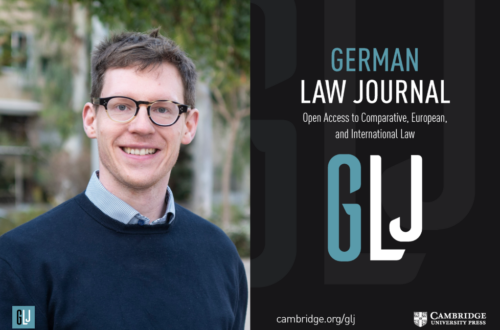Editorial | Volume 25 No. 5
In September we had the honour of welcoming former and current editors, friends old and new, contributors and luminaries to our 25th Anniversary event in Berlin. Hosted at the Max Planck Institute’s Harnack Haus, this celebration was an opportunity for the Editors in Chief, Editorial Board previous and current, and Cambridge University Press to reflect on the past, present, and future of the German Law Journal . We were delighted that Germany’s Federal Justice Minister Dr Marco Buschmann could open our celebrations, and also that Poland’s Justice Minister Dr Adam Bodnar could share his reflections on the rule of law in Poland, the EU, and globally. Also in attendance were scholars from our inaugural Transnational Junior Faculty Forum, in cooperation with Max Planck Law: it was a great pleasure to welcome eleven early career researchers for this two-day workshop (envisaged as a bi-annual commitment for the GLJ), and we look forward seeing what they will accomplish in the future. Indeed, we are grateful to all participants in these events and to all contributors to the Journal and look forward to working with you all over the next 25 years and beyond.
Now, we bring you our fifth issue of 2024. This issue opens with Katharina Ó Cathaoir’s article ‘Deviating from the Norm? The Pregnant Body in Scandinavian Health Law’, which engages with the issues raised by the paradox of pregnant people’s healthcare. Pointing to the problems already caused by gendered healthcare, Ó Cathaoir explores ‘how the political ideal of data interacts with the legal entitlement of autonomy in the care of pregnant people guided by feminist theory and critical approaches to data’.
Urszula Jaremba and Marleen Kappé have investigated the potential causes and motivations for judges’ (non) participation in the process of dialogue with the Court of Justice of the European Union (Article 267 TFEU). In this article, they discuss their empirical research, specifically semi-structured interviews among judges and court référendaires of three Belgian highest courts, with a view to providing novel empirical data aimed at filling what they identify as a knowledge and literature gap.
In their paper, Giovanni Tuzet, Damiano Canale and Alessio Sardo consider scenario analysis, which is to say, a disruptive argumentation technique recently employed by the German Federal Constitutional Court in several cases. They explain and outline this technique, before outlining a normative model for rational scenario design, one that they propose can be used as lens through which the Court’s arguments can be evaluated.
Jakob Hohnerlein, in his article, engages with the idea of constitutional norm revisability. Observing that constitutions often ‘entrench’ specifics of democratic procedures, individual rights, common good principles, and even cultural traditions, he leads the argument that this conflicts with the democratic ideal of constitutional revisability, concluding that ‘attributing norms a special “rigid” formal status requires a specific justification’.
Our penultimate paper of this issue comes from Rebecca Zeilstra , who considers the role of the ‘nudge’ – that is, the ‘policy tool that steers people’s behavior through noncoercive psychological pushes’. Zeilstra takes the position that a legal doctrine is needed effectively to ascertain which nudges need to be subjected to rule of law safeguards to prevent and counteract improper use of nudging policies, and draws inspiration from the “de minimis” principle of the European Court of Human Rights.
Finally, Mauro Megliani concludes this issue with his article on the ‘odious debt doctrine’, a doctrine under which a debt is odious ‘for the population of the borrowing state when it is contracted by a despotic regime for the pursuit of purposes that, “au su des créanciers” (to the creditors’ knowledge), are contrary to the interests of the population’. Megliani proposes that the formalisation of such a doctrine ought be complemented by an equitable rule, on the grounds that this is likely to make it more palatable to national legislators.
As always, happy reading.
Jen Hendry, on behalf of the GLJ EiC






